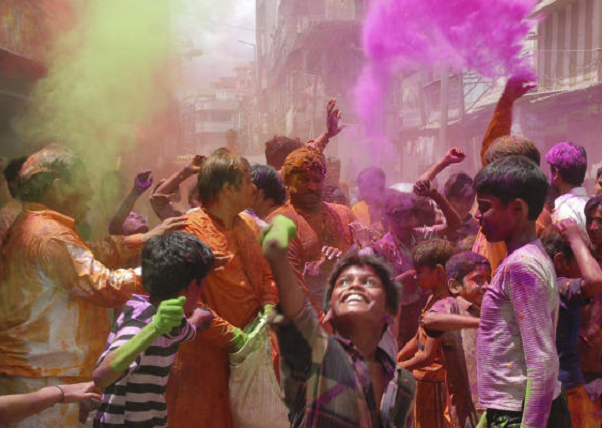[ by Charles Cameron — my favorite Indian festival — and also Modi, the Indian PM candidate whose visitor’s visa for the US was revoked by State a decade ago on the grounds of “violating religious freedom” ]
.
It may be the world’s most playful festival — Holi, the Festival of Colors, is celebrated today, March 17, in India and around the world.
**
The equipment required for play is simple enough: colored powders.
These powders can be thrown at people dry, watered down and tossed at them in balloons, or sprayed from squirt-guns…
**
In each case, the result it the same — brightly-colored people.
And why?
The symbolism of the colors of Holi Festival is that the devotees are “drenched in the colors of devotion” to God, in memory of the brother and sister devotees Holika and Prahlad, who refused to worship their father King Hiranyakashipu as God, although ordered to do so on pain of death.
**
And then there’s Narendra Modi.
Modi is currently running for Lok Sabha on the BJP ticket from Varanasi — the holiest city in India — and will become PM in the event of a BJP win. The elections, in the world’s largest democracy, are scheduled to run for 36 days starting April 5th.
Blog-friend Patricia Lee Sharpe offers some background on Whirledview:
Raze Mosques, Ban Books, Exile Artists
Although some of Modi’s predecessors have played down the religious angle and stressed free market economics to broaden the party’s appeal, the B.J.P. nevertheless adheres to a militantly nationalist ideology based on a (this part is almost funny) Victorian re-interpretation of Hinduism known as Hindutva, and the party belongs to the same political family (aka parivar) as the Rashtriya Swayamsevak Sangh (R.S.S.). As the Hindustan Times says, “Few are convinced that the R.S.S. has no role in B.J.P. politics.”
In its early days R.S.S. members donned khaki, marched around and provided intimidation services for the Hindu Mahasabha and other Hindu nationalists in the manner of coeval Brown and Black Shirts in pre-World War II Europe. It was banned in 1948, after an over-zealous member assassinated Mahatma Gandhi for being too tolerant of Muslims and too reformist visà-vis Hinduism, as in treating “untouchables” like fellow human beings. Reactivated as a “cultural” organization, with a leadership overlapping that of the superficially benign B.J.P., the R.S.S. in 1992 recruited a mob to raze the centuries-old Babri mosque in Ayodya, alleging it had been built over the ruins of a temple to the Hindu man-god Rama. Eventually, the courts intervened, dispatching teams of archaeologists to excavate for evidence of Ram’s temple. In the end, with the mosque destroyed and lacking the least sign of a temple, the judges split the difference: Hindus and Muslims get to use court-allocated portions of the disputed site. Naturally, neither side is happy.
Moving forward to 2013, Hindutva sympathizers have been responsible for the Indian High Court’s decision to ban a book by an eminent American Sanskrit scholar on the grounds that its erudite version of a polycentric Hinduism shaped by a multitude of Vedic and non-Vedic traditions might hurt the feelings of some Hindus. As a result, naturally, sales of the ebook version have soared, but fears of violence, if not a justification for the decision, were also not totally unfounded. There were angry demonstrations over attempts to sell Salman Rushdie’s Satanic Verses, which was banned to spare Muslim sensibilities.
And here’s a truly sad case of triumphal, puritanical Hindu communalism: death threats forced M.H. Hussein, India’s most acclaimed modern painter—if you want a Hussein, think in terms of seven figures in U.S. dollars at Sotheby’s—to spend his last days in exile. His “crime”? He, a secular, perhaps even heretical Muslim, had dared to paint some Hindu goddesses veiled (at best) diaphanously. Anyone familiar with the buxom, bare-bosomed devis on Indian temples would have to ask: how else would anyone paint a Hindu goddess? But no one has ever accused religious fundamentalists, whether Hindu, Muslim or Christian, of sophisticated cultural criticism.
**
Modi himself invites you to send e-greetings for Holi Festival on his website:
The joyful occasion of Holi can also be celebrated by sending an egreeting to your near and dear ones. You may do this by visiting the official website of Shri Narendra Modi and sending a personalized e-greeting, along with an audio message by Shri Narendra Modi.





